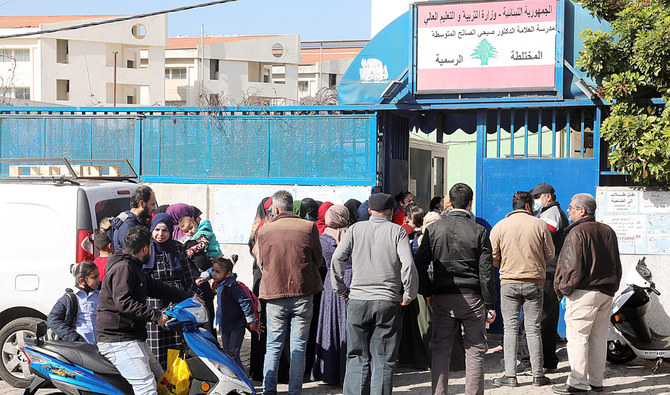BEIRUT: More than 500 candidates, including 69 women, have applied to contest Lebanese parliamentary elections on May 15, with the country’s Ministry of Interior expecting the number to rise dramatically before the midnight deadline on Tuesday.
A total of 517 candidates had submitted applications by late Friday.
The 2018 elections were contested by 976 candidates, including 113 women, but the number fell after the closure of registrations. As a result, 597 candidates, including 86 women, continued in 77 lists across Lebanese constituencies.
The outlook of this year’s election will become clearer after the completion of electoral lists on April 4. Voters will head to the polls on May 15, with candidates competing for the country’s 128 parliamentary seats across 15 electoral districts.
A number of the main parties will officially announce their candidates on Monday.
Speaker Nabih Berri will reveal his candidates, including current MPs and defendants in the Beirut Port explosion hearings, at a press conference.
The Free Patriotic Movement announced its candidates during its seventh annual conference on Sunday. In an address, the party’s leader, Gebran Bassil, attacked his political opponents, including the March 14 Alliance and the civil movement, which he called “a false revolution,” adding that “they will fall.”
Bassil defended Hezbollah and said that its partnership with the FPM in the electoral lists, to be formed later, “is not a program partnership, but a process of integrating votes.”
Hezbollah seeks to ensure that the FPM reaches parliamentary seats with the least possible losses. Hezbollah officials have said: “Whoever fails the Amal Movement and Hezbollah is a partner in the largest regional and international attack that wants to destroy Hezbollah, which protects Lebanon.”
MP Wael Abou Faour of the Progressive Socialist Party said that “the project of the March 8 Alliance (including Hezbollah and its allies) in the elections boils down to obtaining two-thirds of the members of Parliament and thus imposing their spoiled candidate as president of the Republic, (referring to MP Gebran Bassil), controlling constitutional amendments, changing the system and turning the issue of the de facto weapons into a constitutional reality, which will not be the will of the Lebanese.”
The Lebanese Forces party will launch its campaign on Monday to coincide with the anniversary of the Cedar Revolution on March 14.
Candidates representing Lebanon’s Sunni sect are expected to include a number of independent personalities, even those loyal to the late prime minister Rafik Hariri, after the Future Movement asked its members to resign from the party if they decided to run for Parliament.
Lebanese Prime Minister Najib Mikati is likely to back out of the elections. Three MPs from the FM — Rola Tabsh, Mohammed Hajjar and Asim Araji — said they would do the same, confirming their loyalty to Saad Hariri.
Six groups of civil activists on Saturday launched a joint project to unite progressive oppositional forces in one electoral front. The rally set the stage for the drafting of a joint working paper through which the candidates will be announced early next week.
However, parliamentary elections continue to be threatened by Lebanon’s deepening economic crisis and the prospect of the country sliding further toward collapse in the two months leading up to the May 15 poll.
President Michel Aoun has been quoted as saying that “the money for the elections is not yet available.”
Opinion polls carried out by several private institutions on an almost weekly basis showed a decline in voter enthusiasm for candidates, as well as an increase in political ambivalence and resentment of ruling authorities.


























